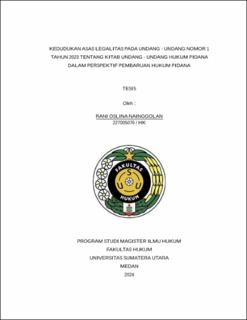| dc.contributor.advisor | Syahrin, Alvi | |
| dc.contributor.advisor | Mulyadi, Mahmud | |
| dc.contributor.author | Nainggolan, Rani Oslina | |
| dc.date.accessioned | 2025-01-20T04:07:12Z | |
| dc.date.available | 2025-01-20T04:07:12Z | |
| dc.date.issued | 2024 | |
| dc.identifier.uri | https://repositori.usu.ac.id/handle/123456789/100324 | |
| dc.description.abstract | The principle of legality is a fundamental principle in criminal law which not only relies on the application of norms in the Criminal Code, but is also a general criminal law principle that applies to rules outside the Criminal Code. Criminal Law Reform with the birth of Law Number 1 of 2023 and the development of the legality principles of the previous Criminal Code which only had Formal Legality Principles and added with Material Legality Principles will certainly have a big impact on the development of criminal law in Indonesia. This research aims to answer the problem of the urgency of developing the Principle of Legality in Law Number 1 of 2023 concerning the Criminal Code in Indonesia from the perspective of Criminal Law Reform. What is the difference between the Principle of Legality in Law Number 1 of 1946 and the Principle of Legality? in Law Number 1 of 2023 concerning the Criminal Code, and what are the consequences of the application of the Principle of Legality in Law Number 1 of 2023 for the development of Criminal Law in Indonesia.The method used in writing this thesis is a normative juridical research method, namely analyzing legal principles using literature study. This research is descriptive in nature, and the data analysis method used is descriptive qualitative.
The results of research on the urgency of developing the Legality Principle in the new Criminal Code become an alternative and balancing principle which can also be used as a basis for punishment in accordance with the needs and culture of the quite diverse Indonesian people. The differences in the principles of legality in the Old Criminal Code and the New Criminal Code are; Firstly, the New Criminal Code emphasizes the prohibition on the use of analogies as stated in article 1 paragraph (2), for which there is no equivalent in the old Criminal Code. Second, there is the addition of an article regarding the application of "Laws that live in society". The position and consequences of the application of the Principle of Legality for the development of Criminal Law in Indonesia are the embodiment of the balance of protecting the interests of collectivities and individuals which in its application is based on; written law which is a legislative product (Lex Scripta); is firm and does not have multiple interpretations (Lex Stricta); realization of legal certainty (Lex Certa); and cannot be applied retroactively (Lex Praevia). | en_US |
| dc.language.iso | id | en_US |
| dc.publisher | Universitas Sumatera Utara | en_US |
| dc.subject | Principles of Legality | en_US |
| dc.subject | Criminal Code | en_US |
| dc.subject | Criminal Law Reform | en_US |
| dc.title | Kedudukan Asas Legalitas pada Undang - Undang Nomor 1 Tahun 2023 tentang Kitab Undang - Undang Hukum Pidana dalam Perspektif Pembaruan Hukum Pidana | en_US |
| dc.title.alternative | The Position of the Principle of Legality in Law Number 1 of 2023 Concerning the Criminal Code in the Perspective of Criminal Law Reform | en_US |
| dc.type | Thesis | en_US |
| dc.identifier.nim | NIM227005076 | |
| dc.identifier.nidn | NIDN0031036302 | |
| dc.identifier.nidn | NIDN0001047403 | |
| dc.identifier.kodeprodi | KODEPRODI74101#Ilmu Hukum | |
| dc.description.pages | 194 Pages | en_US |
| dc.description.type | Tesis Magister | en_US |
| dc.subject.sdgs | SDGs 16. Peace, Justice And Strong Institutions | en_US |


